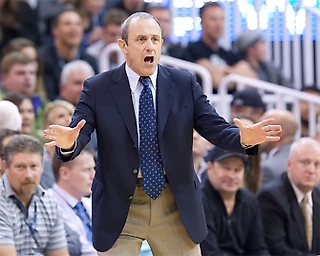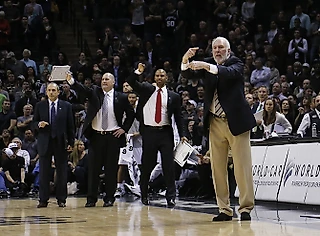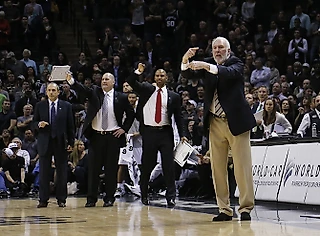Two steps forward – one step back
This season the first entry was about new players who we added to the roster. Now, as we have more information, let’s get back to that topic.
We substituted one player like David Vanterpool (or Oscar Torres) with two players like Nikos Zisis and Ramunas Siskauskas. And we substituted our center Tomas Van Den Spiegel with Marcus Goree who mostly plays power forward. On the perimeter we used to rotate four guards and occasionally used either Zakhar Pashutin or Anton Ponkrashov as the fifth guard in the rotation. Now the rotation itself consists of five players. This means that last season each of four main guards in the rotation was guaranteed enough minutes on the court. If a) we didn’t have injuries or b) none of them was in the foul trouble (which was the case sometimes in the playoffs), everything went OK. We expanded the number of guards to control these two factors as well.
Now the team has to learn how to deal with two designated shooters — Langdon and Siskauskas, as opposed to last year’s one — Langdon. Both of them score in different ways. Langdon relies on his jump-shooting abilities and thus needs either a screen, or somebody like Theo or JR who can create an opportunity for him with the penetration or a pass from the low post when defense traps in the low post. I must say the team reached quite a good balance with this option. Siskauskas likes to attack with a dribble penetration. And he’s also a great shooter.
It’s a major change for the rest of the team to adjust to two shooters playing different styles. It’s like football team trying to integrate another key center-forward in the roster and keeping the previous one at the same time. For this to work well, each of them and the rest of the team must firmly understand that they need to get the ball in different positions in order to use their strengths. It would be much easier to adjust to two scorers with identical characteristics. In our case it takes time, but it makes us more versatile and unpredictable as a team.
As for personalities, Nikos Zisis used to play exclusively point guard in Benetton and to have 30 minutes per game. First, in CSKA, we cannot guarantee him the position. Therefore, like most players in our team (JR, Theo, Siskauskas), he needs to develop the ability to play at least in two positions. Obviously, playing point guard or shooting guard is a completely different job. In our system, if you’re a shooting guard, you’re expected to play much more aggressively to score, if you’re point guard you must be much more aggressive in leading the fast-break, then distributing the ball or creating opportunities for the shooters. Second, Nikos has to learn to bring great quality in much shorter time. This puts a lot of pressure on a player. When he had 30 minutes, he could make 2-3 mistakes and still be on the court. In a team with a high level of competition, he’ll find himself on the bench after just 1-2 mistakes as there are many other good players on the bench and a coach will try to give a chance to another player.
The same applies to Marcus Goree. In Benetton, in Spain and in Frankfurt, he used to play a lot of minutes per game and proved to be very effective in an extended amount of time on the court. Now he should learn to use much shorter spans to bring the same quality. We need him to play close to the basket and his teammates need to find him in that position.
The people who criticize and question his game now are the same people who questioned Langdon, Vanterpool and Smodis rather badly during their first season here. Honestly, I don’t give a damn about the opinion of those so called specialists because most of them didn’t have the courage to admit they were wrong with Langdon, Vanterpool and Smodis. I respect everyone’s opinion, but I went through the same experience in Italy and my first year in Russia. It’s very easy to criticize and not to trust. It’s the easiest thing on earth. Those who criticize Marcus now should ask themselves: if CSKA invited him, maybe they know what they are doing, maybe they see how he can help the team?
f course, there is a chance that one of new players, in the end, may not be the right player for CSKA. But I don’t see the point in cutting the opportunity for the only reason that it takes time to wait to see the result. By the way, in the game against Olympiakos Marcus scored two baskets, grabbed two rebounds and made two very important defensive plays in the last two minutes. That helped us a lot to win the game. So, let’s be patient.
Ramunas is more used to this kind of pressure. He played one year in Panathinaikos, a team with very deep roster, where he never had more than 20-22 minutes per game. The great thing about Ramunas and the main reason we invited him here is that he makes his opponent commit a lot of fouls and, as a result, shoots a lot of free throws. In big games that will come sometimes you don’t win with shooting percentage, you win with rebounds and a number of free throws you shoot. He’s always collecting 5-6 fouls, which means every game he makes one opponent foul out, which is huge as an average.
Intelligent player as he is, Ramunas tried to understand the spacing of the offense, when and where he could penetrate during first weeks. Our offense is different from Panathinaikos’ and Benetton’s offense, so he needed to understand the best way to use his strengths. Second, he was trying to understand what kind of responsibility he could take and the team wants him to take. Usually, it doesn’t come easy. I think he’s been greatly supported by the experience with Pao and the result that he achieved, personally and as a team. This gives him more confidence to tell himself in difficult moments: “Hey, I’m Ramunas Siskauskas. I was a key factor to win the Euroleague. I did very well in European championship with Lithuania. So, wait a minute, even if I play bad, I won’t lose my confidence”. And I see that he is not affected by the pressure.
The team is learning how to use him. We’re trying to organize more situations where we give him the opportunity to move more without the ball instead of waiting for the ball. On the other hand, we’re trying to learn how to use him in the middle of the movement. Not when he’s finishing his cut, but when he’s in the middle of the cut when he becomes very difficult to guard.
Nikos, which is younger and a little less experienced, only in the last three games (that was the first time I used him in the crucial moments by himself without Theo on the side) proved very effective in the last minutes and showed good leadership qualities. So this was the best news we had during last three games.
Plus there is David Andersen who returns to his natural position of center after one year playing mostly as power forward which was logical as we had Savrasenko and Van Den Spiegel in the team.
To sum up, many players are changing their positions and adjust themselves to new roles inside the team. And as a team we work to find new balance with all new responsibilities and roles. The work is still in progress. So if you ask me who will take the last shot in a decisive moment, I don’t have an answer yet. We need to define this in every other game – to whom the team is most comfortable to give the ball in that specific situation. Neither am I sure about the five players to be on the court in that moment. Against Siena I tried to use the players who play here at least for the last two seasons and know each other very well. I needed a unit that would be balanced and would recognize that in this moment our first priority in offense was Matjaz. We try to gradually integrate our new players so they could step up, but in order to be on court in key moments they need to understand what our priorities are and act accordingly.
The main reason we lost two games is our defense. It might seem strange as the score both times wasn’t huge, something around 70-80 points. We allowed too many easy baskets. We could have won those games even scoring 70 points, if we could have been more consistent defensively. Not only in offense, but in defense we have been trying many different things to understand what fits the team better in terms of tactics to use as our man-to-man defense. Our man-to-man defense includes a lot of elements from zone defense. We need to understand when it’s better to switch, how to defend different kinds of pick-and-rolls. For the first two-three months you need to find one way, some basic rules that fit your team and help you to feel comfortable in specific situation and thus build confidence. After that you can enhance your defense by adding up new techniques to use in different situations.
Now that we have one true center, one “four-five” and two “fours”, which is a new combination of big men, I’m trying to find out what principles of pick-and-rolls, switching, helping and so on would work best way for us. As we’ve been trying different options defensively, we’ve made many mistakes in man-to-man defense and allowed the other team to get many offensive rebounds. Poor rebounding was a second key factor in both games.
The third reason was that we were undisciplined. The players on the court were unsure about our priorities in offense in these specific moments, which is mainly my responsibility. So we ended up doing things that were not standing in the logical succession of priorities for those moments. As a result we took shots with the players who at that moment didn’t have an advantage over their opponents, while usually we’re very precise, I’d say, chirurgical, in finding the mismatch. And if the defense moves to cover for this disadvantage we find an open man with a pass. At the moment we’re not doing this.
With Olympiakos, however, it was the first case we out-rebounded the other team in spite of their being big and tall team. Also it was the first time we had 16 offensive rebounds in the game. It’s coming, but it still needs a little bit more time.
The good thing is that we came up with a win against Olympiakos after two defeats. The third defeat could affect not only the result itself, but the morale of the team. The great thing about my team that I saw, even if I continue to try, to experiment, is that they come to practice every day and try to do what is requested whole-heartedly. I hope that we’ll keep on progressing in the upcoming games.
Now I can say it. We all expected the process of integrating new players would have been shorter. Then we realized it’s going to take more time: maybe two-three months, maybe it will cost us some lost games, some pain, some extra-practice. It’s a little bit frustrating for the players. We’ve been at a good level. And to try to be at a little higher level, we started by making several steps backwards. But it’s normal. This is the first reaction. However we keep working hard to raise the level. At the same time I see the willingness of players to help their teammates. We all believe that with these new players we could play a little better that we did last season and this will give us a better chance to win the title. But we don’t know yet, nobody does. Maybe we will not. We’ll see.




